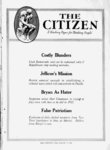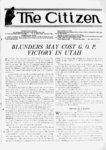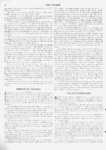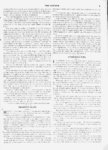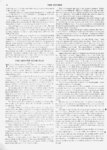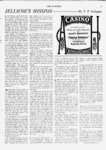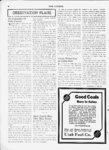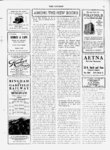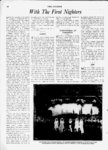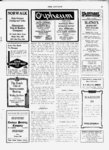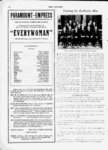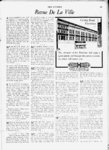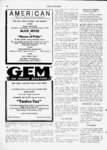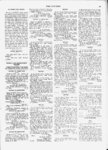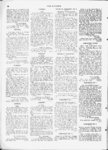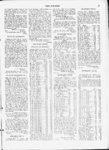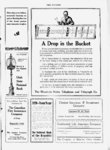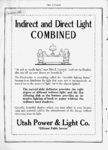| OCR Text |
Show THE CITIZEN 4 true state of affairs even from the most devoted followers of Mr. Bryan and Mr. Wilson. One cannot help .suspecting that Mr. Bryan cherishes several grudges under the white wings of peace. Not only did the President flout him by refusing to compromise on the treaty but actually insulted him by remaining silent on that sacred tenet of Bryanistic faith the third term. From the far days of 1896 when he dictated his first platform to the less remote days of 1912 when he dictated the Wilson platform Mr. Bryan was immutably against third terms. Indeed, he grew less tolerant as the years passed. When he was running for President he was against a third term and when the time came that a rival was running on the Democratic ticket he was for but a single term. In the 1912 platform, due to the stern requirements of Mr. Bryan, was this plank : We favor a single presidential term, and to that end we urge the adoption x)f an amendment to the constitution making the President of the United States ineligible for and we pledge the candidate of this convention to this principles. We pledge should have read, I, William Jennings Bryan, pledge T. Woodrow Wilson, but let that go. The candidate of this convention found the situation created by Mr. Bryan mildly amusing and did not hesitate to repudiate the plank when the opportunity pleasantly presented itself. As soon as a move was made in Congress to provide for the carrying out of the terms of the platform the President put a quietus on it by the easy process of an adverse intimation. In 1916, when President Wilson was renominated, Bryanism had sunk into such a state of desuetude, that no mention was made of third term, nor even of to a second term. Those who know Mr. Bryan well say that he is as Those who know Mr. Bryan well say that he is as forgiving as a Sicilian bandit. In fact, he has sometimes shown that he considers revenge one of the sweetest elements of the strenuous political struggle. The manner in which he stamped on his old foes of the Wall Street wing of the Democratic party at the 1912 convention is a vivid recollection of what he might desire to do to a gentleman who insisted on running for a third term after forcing a certain Lincoln, Neb., commoner out of the cabinet. With half an eye one can see that the Democratic two-rin- g or three-rin- g circus is going to be joyous divertisement after a hard full-blo- wn re-electi- . on, of the senate. Instead he arrogated to himself the sole right of negotiating the most complex treaty in the worlds history. Bryan seeks to excuse him or to unmask him with the argument that he was pitted against the world and did the best he could. The inescapable conclusion of such a contention is that he should not have permitted himself to be alone against the world. He should have utilized the brightest minds among his own people to protect him against the machinations of powers. The President merely emphasizes the enormity of his blunders when he insists that we trust the same powers that worsted and overthrew him. But even after he had blundered the President could have rectified his errors by permitting the United States Senate, without interference from him, to adopt Americanizing reservations. Then he could have stood by his own people against the world. Instead he took his stand irrevocably for European imperialism and refused to see any good in American modifications. He still demands that the United States Senate pass Article X without change and thereby guarantee that the United States, when instructed by the supreme council, will make war to preserve British or French empire or to hold up the tottering walls of every new nation created by the terms of the self-seeki- ' ng DEMOCRATIC DISCORDS treaty. Bryan takes issue with him squareljr on Article X, showing that a moral obligation to wage war will exist if we ratify that article. When the council calls upon us to make war Congress, if it refuses to declare war, will be put in the position of violating a moral obligation to which the contry has already agreed in a covenant signed, sealed and delivered. Bryan sees the peril and points out that the guarantee once given, will be binding on Congress. Naturally he warns the country not to give the guarantee. Not so, the President. He stands where he stood the day he returned from Europe and virtually the whole country has moved away from Him a greater or less distance. It may be that the President, when he speaks of a great and solemn referendum, does not mean that there shall be any formal set of questions submitted to the voters. He may mean merely that the treaty shall be permitted to become an issue in the campaign. Even so, the same complexities would arise. There would be among the candidates and the voters the same factions that exist in the Senate. The campaign would be a bedlam. We do not believe that the Presidents challenge will be accepted even by his own party. Sentiment is coalescing to pass the treaty in some form and get it out of the way. And that sentiment is growing ever more strongly in favor of ratifying the treaty only after it has been modified bv strict reservations. discords were but the echo of the Democratic party's JACKSON day THE FIVE COMMUNISTS re-electi- on winter. T disunity almost on the eve of the national campaign. If the Democrats cannot agree among themselves how can they expect the country to support their party? Nor can they contend that the disunity is of a minor character. Between the President and William Jennings Bryan there is an issue which divides the Democratic party in twain. The President takes the position that the two treaty-makin- g factors the executive and the Senate have failed to agree and that this warrants a great and solemn referendum on the treaty. Bryan has shown the fallacy of the Presidents position. A referendum would cause a delay of fifteen months and even then the Democrats could not hope to pass the treaty unless they had obtained control of the Senate. a two-thirIt is easy to propose a referendum ; difficult to suggest the form the referendum should take. There would be just as much disagreement as to the form of the referendum as there is to the form of the treaty, nor could the party platforms be so complex a question before the voters fairly. Senator King, defending the Presidents course, argues that the President could not have done otherwise than insist upon the ratification of the treaty as he had negotiated it. To have done otherwise would have been to show bad faith toward the nations with whom lie had negotiated the treaty, says the senator. There were several ways out of that difficulty. In the first place, the President could have availed himself of the advice and consent ds . , 90 the exclusion of Burger from the national House of and the exclusion of five members from the New York legislature there is a distinction which should be emphasized in the interest of liberty. Burger is a convicted traitor. His trial was due process of law. He was given a chance of avail himself of all the defenses permitted in our courts. There was no question but that he had received a fair trial and at the end of that trial he was pronounced guilty by twelve good men and true. Exercising its arbitrary power to determine its own membership the national House of Representatives used that power wisely in excluding a felon who had sought the overthrow of his own government BETWEEN by a foreign enemy. The case of the five New York Socialists is different. They are, it is true, under suspicion of advocating the overthrow of the government by violence. The suspicion rests upon certain expressions they have employed in their speeches and upon their membership in the communist party. They admit that they are working for the day when the American government will exist no longer in its present form, but they insist that they arc not advocating violent revolution and will not advocate it until all peaceful means of obtaining their object have been tried in vain. Relying on the revelations of the Lusk committee, the members of the New York legislature suspended the five communists, but the j f |
